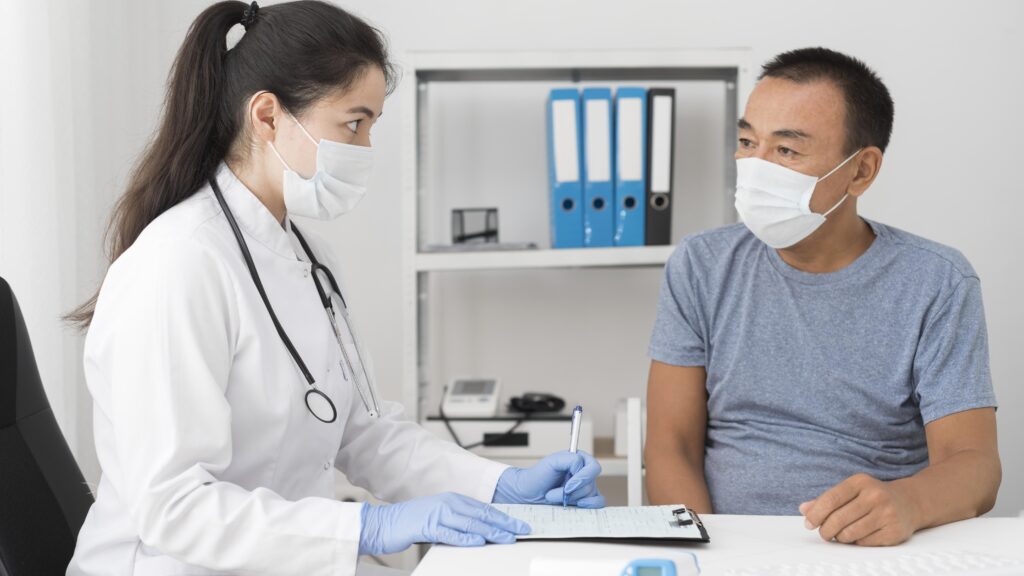Diarrhea is a common health issue, often mild and short-lived, but in some cases, it can be a sign of a more serious condition requiring urgent care. In Southington, CT, recognizing when to seek medical attention for diarrhea is crucial for your health and well-being. Here we will explore the eight warning signs indicating that a visit to urgent care in Southington, CT, is necessary.
Table of Contents
Key Takeaways
- If diarrhea lasts more than two days in adults, it’s crucial to seek medical attention at an urgent care in Southington, CT.
- Experiencing intense or localized abdominal pain with diarrhea is a sign to visit urgent care immediately.
- Symptoms like dry mouth, dizziness, or reduced urine output alongside diarrhea indicate a need for urgent care evaluation.
- A fever above 102°F with diarrhea suggests a possible serious infection, warranting a visit to urgent care in Southington, CT
- The presence of blood or unusually dark stools with diarrhea is a critical sign to seek urgent medical care.
- Persistent dizziness or weakness during a bout of diarrhea can be a symptom of severe dehydration, requiring urgent care.
- Significant, unintentional weight loss accompanying diarrhea should prompt a medical evaluation at an urgent care in Southington, CT.
- Experiencing confusion, excessive sleepiness, or irritability with diarrhea necessitates immediate attention at urgent care in Southington, CT.

1. Persistent Symptoms
Persistent symptoms of diarrhea are a major indicator that one should consider seeking medical attention at an urgent care in Southington, CT. While occasional diarrhea is common, prolonged symptoms can signify a more serious health issue. It is essential to monitor the duration and severity of symptoms to determine the need for medical intervention.
Duration of Symptoms
- Timeframe: Concern arises when diarrhea persists beyond two days for adults.
- Chronic Diarrhea: Diarrhea lasting for weeks may indicate serious health conditions.
Severity and Accompanying Symptoms
- Intensity of Symptoms: Severe or debilitating diarrhea is a red flag.
- Additional Symptoms: Fever, nausea, and abdominal cramps alongside diarrhea are concerning.
Impact on Health and Lifestyle
- Dehydration Risk: Persistent diarrhea significantly increases the risk of dehydration.
- Effect on Daily Activities: Struggling with daily routines due to diarrhea is alarming.
2. Severe Abdominal Pain
Severe abdominal pain associated with diarrhea is a critical warning sign that shouldn’t be ignored. It often indicates a more serious condition that requires immediate attention at an urgent care in Southington, CT. Here’s a deeper look into why severe abdominal pain is a red flag:
Nature of the Pain
- Intensity: Sharp, intense pain is more alarming than mild, intermittent discomfort.
- Location: Pain localized in a specific area may point to certain conditions like appendicitis.
Associated Symptoms
- Other Symptoms: Nausea, vomiting, or fever accompanying the pain increases the severity.
- Change in Bowel Movements: Blood in stools or a significant change in bowel habits alongside pain is concerning.
Impact on Daily Functioning
- Activity Limitation: Pain that limits movement or daily activities is a serious concern.
- Sleep Disruption: If the pain is severe enough to disturb sleep, it needs medical attention.
3. Dehydration
Dehydration is a serious concern in diarrhea, and it often necessitates a visit to an urgent care in Southington, CT. It can occur rapidly, especially in children and the elderly, and can lead to severe health complications if not addressed promptly. Understanding the signs and implications of dehydration is key to managing this risk.
Recognizing Dehydration
- Symptoms: Look for dry mouth, excessive thirst, reduced urine output, dark-colored urine, and fatigue.
- In Children and Infants: Sunken eyes, dry diapers, and lethargy are critical signs in young ones.
Addressing Dehydration
- Initial Steps: Increase fluid intake with water and oral rehydration solutions.
- When to Seek Care: If symptoms persist or worsen despite taking fluids, it’s time to visit urgent care in Southington, CT. Severe dehydration may require intravenous fluids, which are administered at urgent care centers.
Preventing Dehydration
- Hydration: Regular fluid intake is essential, especially when experiencing diarrhea.
- Dietary Adjustments: Consuming foods with high water content can help maintain hydration levels.

4. High Fever
A high fever accompanying diarrhea is a significant warning sign that often requires a visit to urgent care in Southington, CT. This combination of symptoms can indicate a more serious infection or condition that needs immediate medical attention. Understanding the implications and actions to take is crucial for your health.
Understanding High Fever
- Temperature Threshold: A fever is generally considered high when it is above 102°F (39°C) in adults and slightly lower in children.
- Infection Indicators: High fever often points to an infection, which could be bacterial or viral.
High Fever and Diarrhea
- Complications: High fever can lead to dehydration, especially when coupled with diarrhea.
- Children and Elderly: These groups are more susceptible to the adverse effects of high fever.
- Medical Evaluation: The combined symptoms of high fever and diarrhea are a clear indication to seek medical attention at an urgent care facility. Persistent high fever, especially with diarrhea, should prompt a visit to an urgent care in Southington, CT.
Managing Fever
- Home Care: Use over-the-counter fever reducers and maintain hydration.
- Monitoring: Keep a close eye on the fever’s progression and other developing symptoms. If the fever doesn’t subside or is accompanied by other severe symptoms, it’s time to visit urgent care in Southington, CT.
5. Bloody or Black Stools
The presence of bloody or black stools during a bout of diarrhea is a critical warning sign and typically requires a visit to urgent care in Southington, CT. This symptom can indicate a serious underlying condition, such as gastrointestinal bleeding, and should not be ignored.
Identifying Bloody or Black Stools
- Visual Indicators: Bright red blood or very dark, tarry stools are key signs. For example, black stools often suggest bleeding from higher in the gastrointestinal tract. It’s best to seek out urgent care in Southington, CT, to carefully assess the situation.
- Immediate Action: If you notice these symptoms, it’s crucial to seek medical care at an urgent care in Southington, CT promptly.
Potential Causes
- Infections: Certain gastrointestinal infections can cause bloody stools.
- Inflammatory Conditions: Conditions like ulcerative colitis or Crohn’s disease can lead to bleeding.
Risks and Complications
- Severity of Condition: Bleeding in the digestive tract can be a sign of a serious health issue.
- Anemia Risk: Ongoing blood loss can lead to anemia, exacerbating weakness, and fatigue which may require a visit to urgent care in Southington, CT.
6. Severe Weakness or Dizziness
Experiencing severe weakness or dizziness in conjunction with diarrhea is a warning sign that should not be overlooked and may require a visit to urgent care in Southington, CT. These symptoms can indicate significant dehydration or other serious conditions that need immediate medical attention.
Understanding the Symptoms
- Severity and Frequency: Occasional light-headedness may not be alarming, but persistent or severe dizziness and weakness are concerning. When these symptoms occur alongside diarrhea, they can signify major fluid and electrolyte imbalances.
Potential Underlying Causes
- Dehydration: Dehydration is a common result of prolonged diarrhea, which leads to dizziness and weakness. Additionally, certain infections that cause diarrhea can also impact your overall strength and balance.
Risks and Consequences
- Safety Concerns: Severe dizziness and weakness can increase the risk of falls and injuries.
- Systemic Impact: These symptoms can affect your cardiovascular and neurological systems. To mitigate risks and address the root cause, seek care at an urgent care in Southington, CT.
7. Weight Loss
Unexpected weight loss accompanying diarrhea is a significant warning sign and may be a sign of a more serious underlying condition. As such, it often necessitates a visit to urgent care in Southington, CT. This symptom can indicate underlying health issues that require immediate medical attention.
Rapid or Unintentional Weight Loss
- Extent of Weight Loss: Noticeable weight loss over a short period, without trying, is concerning. When coupled with diarrhea, it could indicate malabsorption or more serious conditions. If you experience significant weight loss along with diarrhea, it’s important to seek professional advice at an urgent care in Southington, CT.
Potential Health Implications
- Digestive Disorders: Conditions like celiac disease or inflammatory bowel disease (IBD) can lead to weight loss and diarrhea.
- Systemic Impact: Weight loss can impact overall health, weakening the immune system and affecting bodily functions. Diagnosing the cause of unintentional weight loss and diarrhea often requires medical expertise, available at urgent care in Southington, CT.
Managing the Condition
- Nutritional Support: Focus on a balanced diet and proper hydration, especially if experiencing diarrhea.
- Monitoring Changes: Keep track of your weight and any other symptoms. Sudden weight loss coupled with other symptoms like diarrhea should be evaluated at an urgent care in Southington, CT.

8. Changes in Mental State
Notable changes in mental state accompanying diarrhea are a serious warning sign and typically warrant immediate medical attention at urgent care in Southington, CT. These changes can include confusion, disorientation, or unusual levels of drowsiness and can be indicative of severe dehydration or other serious health issues.
Identifying Mental State Changes
- Symptoms to Watch For Confusion, difficulty concentrating, severe drowsiness, or uncharacteristic irritability. These symptoms, when occurring with diarrhea, can be signs of severe dehydration or infection. Any significant alteration in mental state, especially with diarrhea, requires prompt evaluation at an urgent care in Southington, CT.
Underlying Causes
- Severe Dehydration: This can lead to altered mental functioning due to electrolyte imbalances. Certain illnesses causing diarrhea can also affect brain function.
- Medical Assessment Needed: Determining the cause of these changes often necessitates professional medical care, which can be provided at urgent care centers in Southington, CT.
Risks and Implications
- Safety Concerns: Changes in mental state can increase the risk of harm due to impaired judgment or awareness. Frequent or severe diarrhea can significantly affect an individual’s quality of life, leading to stress, anxiety, and depression. These psychological factors can further exacerbate changes in mental state during episodes of diarrhea.
- Urgency of Treatment: These symptoms can escalate rapidly and require immediate medical intervention. It’s critical to visit an urgent care in Southington, CT, for these symptoms to prevent severe complications.
Common Causes Diarrhea
Diarrhea can be caused by a variety of factors, each potentially leading to the need for medical attention if symptoms become severe. The most common causes include:
- Infectious Agents: Viruses, bacteria, and parasites can cause diarrhea, often through contaminated sources.
- Dietary Triggers: Food intolerances, allergies, and certain ingredients like artificial sweeteners can lead to diarrhea.
- Medication-Induced Causes: Some medications, especially antibiotics, can disrupt the gut balance, resulting in diarrhea.
- Chronic Digestive Conditions: Disorders like IBS, Crohn’s disease, and Ulcerative Colitis contribute to frequent or chronic diarrhea.
- Lifestyle and Psychological Factors: Stress, anxiety, and consumption habits like excessive alcohol or caffeine on digestive health and can lead to diarrhea.
Effective Prevention Strategies for Diarrhea
Diarrhea, while often a common and manageable condition, can sometimes lead to serious health complications if not properly prevented or treated. Understanding and implementing effective prevention strategies is key to maintaining good digestive health.
- Hygiene and Sanitation: Practice regular hand washing, especially before meals and after using the bathroom, to prevent the spread of infectious agents that can cause diarrhea. Also, ensure proper food handling and preparation techniques to avoid contamination.
- Dietary Management: Avoid specific foods and ingredients that are known to trigger diarrhea. This includes dairy for lactose intolerant individuals or gluten for those with celiac disease. Following a balanced diet rich in fiber helps maintain gut health.
- Mindful Medication Use: Seek consultation with healthcare providers before starting new medications that could potentially cause diarrhea. For those on necessary medications like antibiotics, discuss the possibility of probiotics or other supplements to maintain gut balance.
- Stress Reduction Techniques: Understand the link between stress and digestive health, and practice stress management techniques such as regular exercise, meditation, and adequate sleep to help reduce the occurrence of stress-induced diarrhea.
- Regular Medical Check-Ups: Have regular health check-ups to identify and manage any underlying conditions that might contribute to chronic diarrhea, such as digestive disorders or food intolerances. Keeping up with these appointments can help in early detection and management of potential triggers.

Frequently Asked Questions (FAQs)
Are there specific foods or drinks I should avoid to alleviate diarrhea?
When experiencing diarrhea, it’s advisable to follow a bland diet, such as the BRAT diet (bananas, rice, applesauce, and toast), as these foods are easy to digest. Avoid dairy products, fatty foods, high-fiber foods, and spicy foods as they can exacerbate symptoms. It’s also important to stay hydrated. Avoid caffeine and alcohol as they can lead to dehydration.
Is diarrhea a common symptom of COVID-19 or other viral infections?
Diarrhea can be a symptom of COVID-19 and other viral infections. It’s usually considered serious enough to seek urgent care if it’s severe, persists for more than two days, or is accompanied by high fever, severe dehydration, blood in stools, or significant weakness. In the case of COVID-19, persistent or worsening respiratory symptoms alongside diarrhea also warrant urgent care.
What are the key differences between diarrhea caused by viral infections and bacterial infections?
Viral diarrhea typically resolves on its own and is often accompanied by symptoms like fever and muscle aches. Bacterial diarrhea may present with more severe symptoms like high fever, severe stomach cramps, and bloody stools. Bacterial diarrhea often requires medical intervention and sometimes antibiotics. If symptoms are severe, persistent, or include bloody stools, seeking urgent care is advisable regardless of the cause.
After experiencing diarrhea, how long should I wait before allowing my child to return to school?
Children and infants should stay home until diarrhea has stopped for at least 24 hours. Ensure they are well-hydrated and have resumed a normal diet before returning to school or daycare. Teach them good handwashing practices to prevent the spread of infection. If diarrhea is accompanied by fever, rash, or vomiting, consult a healthcare provider before they return.
What over-the-counter medications are recommended for treating diarrhea?
Over-the-counter medications like loperamide (Imodium) can help reduce the frequency of diarrhea in adults. These medications are usually appropriate for mild, short-lived cases. However, they’re not recommended for severe diarrhea, diarrhea with fever or bloody stools, or for young children. If diarrhea is severe, persistent, or accompanied by other concerning symptoms, it’s better to seek medical attention rather than self-treating with OTC medications.
Seek Immediate Care for Diarrhea at DOCS Urgent Care – Southington!
If you’re experiencing any of the warning signs of serious diarrhea, don’t hesitate to seek professional medical care. At DOCS Urgent Care – Southington, our team of experienced healthcare professionals is ready to provide you with compassionate, efficient, and comprehensive care. We understand the urgency and discomfort that comes with gastrointestinal issues, and we are equipped to offer prompt diagnosis and effective treatment. Visit us today!

